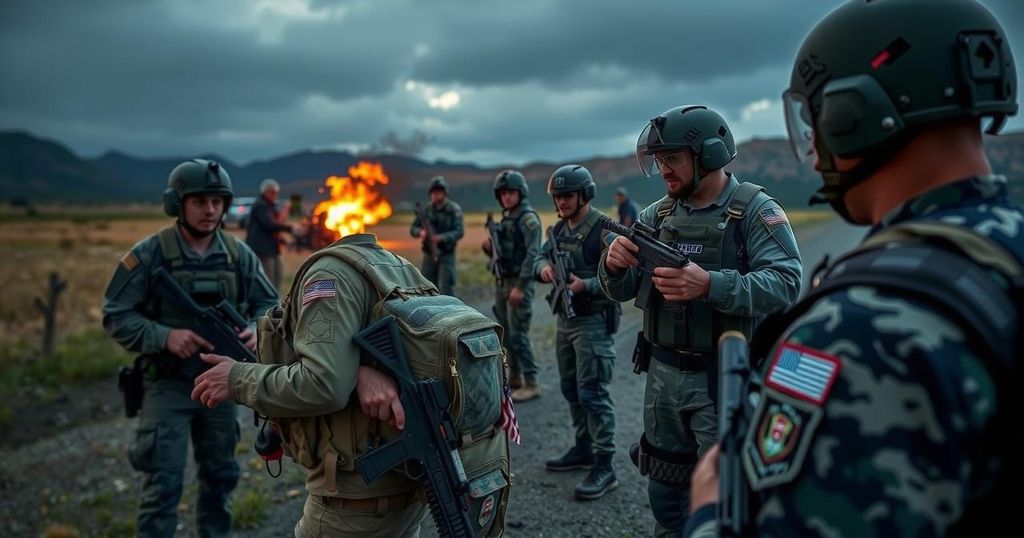Crime
AFRICA, ASIA, ASSOCIATED PRESS, CALIFORNIA, CHIAPAS, COLOMBIA, CRIME, CUBA, DEFENSE DEPARTMENT, EGYPT, FOREIGN RELATIONS DEPARTMENT, GOVERNMENT, GUN VIOLENCE, HUMAN TRAFFICKING, LAW ENFORCEMENT, MEXICO, MEXICO ' S, NATIONAL GUARD, NORTH AMERICA, ORGANIZED CRIME, PHILIPPINES, SOUTH AMERICA, TECATE, THE ASSOCIATED PRESS, U. S, UNITED STATES, US, VIOLENCE
Marisol Gonzalez
0 Comments
Tragic Confrontation: Mexican National Guard Kills Two Colombians at U.S. Border
The Mexican National Guard shot and killed two Colombians and injured four more in a confrontation near the U.S. border. The incident occurred during a patrol that was fired upon by suspicious trucks. It highlights the troubling trend of Colombian nationals becoming involved in Mexico’s cartel violence as they navigate perilous migrant routes. The incident may strain diplomatic relations between Colombia and Mexico.
On a secluded road near Tecate, Mexico, close to the U.S. border, the National Guard engaged in a confrontation that resulted in the deaths of two Colombian nationals and injuries to four others. The Mexican Defense Department reported that the patrol was fired upon while investigating two suspicious vehicles. While one truck managed to escape, the other was intercepted, leading to the incident. Thankfully, no National Guard personnel were harmed during the exchange. The wounded individuals’ medical conditions remain undefined, and there is uncertainty about their status as migrants. One Colombian was not injured and was handed over to immigration officials. Investigators discovered a firearm and several ammunition magazines associated with assault weapons nearby, hinting at a possible connection to organized crime. However, discrepancies in reports about the incident raise questions about the nature of the group involved and whether they were victims or linked to cartel activities. This incident spotlights the growing involvement of Colombians in Mexico’s cartel networks. Reports indicate that some Colombians are recruited as enforcers for drug trafficking organizations, which also engage in human smuggling. Despite such involvement, it seems likely that the individuals in these encounters are primarily unarmed civilians, drawn into the escalating violence of Mexico’s militarized border areas. In light of the event, three National Guard members who opened fire have been relieved of their duties. This shooting is part of a troubling pattern; only weeks earlier, soldiers in Chiapas mistakenly fired on a truck, resulting in the deaths of six migrants. Critics emphasize that Mexico’s militarized approach to law enforcement exacerbates the dangers faced by vulnerable populations, including migrants subjected to exploitation and abuse by both criminal organizations and state actors. Under the leadership of former President Andrés Manuel López Obrador, the military’s role in civil society has expanded considerably, leading to a controversial integration of military forces into public safety operations. Critics argue that the military lacks the requisite training for effective civilian law enforcement. Colombia’s response to the events has been measured, with diplomatic officials seeking further explanations and accountability regarding the victims’ deaths. The Colombian Foreign Ministry has expressed that the deceased were migrants who became collateral damage in this encounter. However, this incident may put a strain on Colombian-Mexican relations and highlight the perils migrants face while traversing perilous routes towards the United States.
The incident involving the deaths of two Colombians at the hands of Mexico’s National Guard underscores the escalating violence in the country’s border regions, where organized crime has increasingly implicated Colombian nationals. Colombia has been facing a rising tide of drug trafficking and cartel violence that extends into Mexico, where some individuals are reportedly recruited into cartels. Such events reveal the complexities faced by migrants traversing these tumultuous areas, often caught between cartel activity and militarized law enforcement excited to stem drug trafficking. The Mexican military’s expanded role in governance and law enforcement has drawn criticism due to its lack of adequate training for civilian interactions, leading to deadly encounters that disproportionately affect vulnerable populations. Previous incidents involving the National Guard and migrants have raised alarms among human rights advocates, reinforcing concerns about the militarization of border enforcement and its implications for civilian safety. This clash not only highlights the risks faced by undocumented individuals trying to reach the United States but also emphasizes the broader geopolitical ramifications, as Colombia seeks to manage the fallout with its citizenry while addressing its own issues with crime and security.
In summary, the tragic confrontation between Mexico’s National Guard and a group involving Colombian nationals near the U.S. border has intensified scrutiny of the militarization of Mexico’s law enforcement tactics. The incident, which resulted in fatalities and injuries, raises concerning questions about incoming migrants’ safety and the broader implications for Colombian-Mexican diplomatic relations. As advocacy groups continue to challenge the increasing military presence on the streets, the complexities surrounding organized crime and the plight of migrants must remain in focus for policymakers attempting to resolve this multifaceted humanitarian crisis.
Original Source: www.newsweek.com




Post Comment